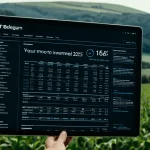Understanding the Commercial Property Landscape in the UK
Commercial property insights in the UK reveal a dynamic and evolving market. The current state is shaped by a blend of factors such as economic recovery, shifts in consumer behaviour, and technology adoption. Despite economic uncertainties, opportunities for small business growth abound, provided entrepreneurs stay adaptable.
Several key factors influence property values and small business expansion. Location remains a crucial determinant. Properties in urban centres, boasting excellent transport links and high footfall, often command higher values and provide more commercial opportunities. Meanwhile, emerging areas may offer attractive investment options for businesses willing to pioneer.
This might interest you : Unlocking Property Investment Potential: How Partnering with an Independent Financial Advisor Boosts Success
The importance of location in determining commercial success cannot be overstated. Areas with affluent demographics, strong community support, and robust infrastructure often foster thriving businesses. Conversely, locations lacking these attributes may hinder growth.
Market demands are also shifting. A desire for sustainable and flexible workspaces acts as a significant factor in property selection. With these insights, businesses seeking to enter or expand within the UK market must weigh these considerations carefully. Informed decisions can lead to profitable ventures, supported by adaptable strategies that align with evolving market trends.
Topic to read : Unlock Your Homeowning Dreams: Smart Financial Tips for Fresh UK Graduates to Climb the Property Ladder
Effective Tactics for Property Enhancement
In today’s market, property upgrades can significantly enhance a business’s appeal and functionality. One effective tactic involves focusing on high-impact areas. These are zones within a property that, when improved, can drastically change the perception and efficiency of a space. Key examples include entryways, facades, and reception areas, which serve as a business’s first impression to potential clients and customers.
Cost-effective strategic improvements can elevate both the interior and exterior of a commercial property. Interior enhancements might involve modern lighting solutions or ergonomic furniture arrangements that boost productivity. Exterior upgrades, such as landscaping or digital signage, can draw in foot traffic and create a welcoming atmosphere.
Incorporating technology is another critical strategy. Smart systems, like automated lighting or heating, not only save on operational costs but also promote an eco-friendly image. Technology can streamline business operations, making properties more attractive to tenants and clientele who value innovation.
Together, these tactical improvements ensure your property remains competitive and appealing. By prioritizing upgrades in these areas, small business owners can optimize their space for success, attracting more customers and fostering growth in the dynamic UK market.
Case Studies of Successful UK Small Businesses
Examining diverse success stories offers insightful perspectives on small business breakthroughs in the UK. These case studies highlight innovation and resilience.
Retail Sector Innovations
In the dynamic retail sector, several businesses have leveraged creative strategies to thrive. For example, a small bookstore integrated an online platform, expanding its reach globally while maintaining local charm. This fusion of digital presence with physical allure highlights the power of adaptability in the modern market.
Transformative Commercial Renovations
Commercial renovations can evolve business landscapes. A café in London transformed a traditional layout into a sustainable, open-concept space. The integration of eco-friendly materials not only enhanced customer experience but also significantly reduced operational costs, showcasing the benefits of thoughtful design.
Creative Repositioning Strategies
Repositioning strategies are crucial for rebranding and revitalization. A family-owned restaurant reimagined its menu and dining experience, focusing on locally-sourced ingredients and thematic evenings to attract a broader audience. This strategic shift led to increased customer engagement and sustained revenue growth.
These examples underscore the importance of innovation and strategic thinking. By embracing change, small businesses can not only survive but also thrive in the competitive UK commercial landscape. Each case illustrates a unique approach to overcoming challenges and seizing opportunities.
Financial Considerations for Property Investments
Navigating the financial landscape of commercial property investments involves insightful financial planning and strategic maneuvering through varied investment strategies. An essential step is budgeting effectively for property enhancement and renovation projects. Start by assessing required upgrades and estimating costs to ensure alignment with your financial capabilities.
Understanding funding options is crucial for small business owners aiming to invest in property. Traditional loans, venture capital, and government grants are potential routes, each with distinct benefits and obligations. These options play a pivotal role in moderating the upfront financial burden and facilitating medium to long-term financial health.
The financial implications of property investments can significantly impact business operations and anticipated returns. Investors must consider ongoing maintenance costs, the potential for property appreciation, and market-driven rental yield. While specific financial outcomes remain subject to market fluctuations, strategic planning can mitigate risks.
Emphasising the importance of a robust financial strategy, businesses can confidently pursue opportunities within the UK commercial property arena. By approaching investments with clarity and informed foresight, businesses position themselves for healthy financial returns and sustained growth. This pathway to financial stability supports expansion and resilience in an ever-evolving market.
Market Trends and Their Implications
The UK commercial property market is influenced significantly by evolving economic factors. Current trends highlight a shift towards sustainable developments as both businesses and consumers become more eco-conscious. This shift is not just a trend but a potential driver for businesses looking to invest in eco-friendly solutions — a move that can lead to long-term savings on energy costs and satisfy consumer demand for sustainability.
Another key trend is the rise of hybrid workspaces, a result of changing work patterns post-pandemic. This is prompting businesses to reconsider their space needs, favouring flexible property options that can adapt to shifting demands. Thus, small businesses are finding opportunities in properties that offer modular configurations to accommodate various operational requirements.
Economic shifts, such as fluctuating interest rates and inflation, also impact property investments, driving some businesses to seek properties in emerging areas for more competitive pricing. Meanwhile, understanding these trends helps businesses anticipate future changes and prepare accordingly. By analysing emerging patterns and remaining adaptable, small businesses can harness these trends to stay competitive, ensuring they make informed property choices that align with their growth objectives and the broader market landscape.
Resources and Expert Insights
In the realm of commercial property, leveraging expert analysis and valuable resources is crucial for small business success. These tools not only guide property enhancement efforts but also enable strategic business growth. Access to recommended resources can streamline the decision-making process for business owners venturing into property development. Websites, industry reports, and professional networks provide indispensable information on market dynamics and best practices.
Interviews with experts in the field of commercial property offer invaluable insights into the intricate web of business expansion. Experts can illuminate the nuances of market trends—sharing how businesses can effectively navigate them. Moreover, seasoned professionals can relay firsthand experiences and strategies that have propelled property investments forward.
Adopting strategies for continuous learning is fundamental for business owners aiming to stay competitive. Workshops, seminars, and online courses present opportunities for ongoing professional development in property management. Embracing such educational avenues not only broadens understanding but also cultivates innovative approaches to property-related challenges.
Overall, grounding investments in business support frameworks ensures a well-rounded growth trajectory. By harnessing expert knowledge and robust resources, small businesses can seamlessly adapt to changes and remain poised within the evolving UK commercial property landscape.

